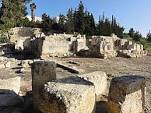
Plague of Amwas
The plague of Amwas, also spelled plague of Emmaus, was a bubonic plague epidemic that afflicted Islamic Syria in 638–639, during the first plague pandemic and toward the end of the Muslim conquest of the region. It was likely a reemergence of the mid-6th-century Plague of Justinian. Called after Amwas in Palestine, the principal camp of the Muslim Arab army, the plague killed up to 25,000 soldiers and their relatives, including most of the army’s high command, and caused considerable loss of life and displacement among the indigenous Christians of Syria. The appointment of Mu’awiya ibn Abi Sufyan to the governorship of Syria in the wake of the commanders’ deaths paved the way for his establishment of the Umayyad Caliphate in 661, while recurrences of the disease may have contributed to the Umayyad dynasty’s downfall in 750. Depopulation in the Syrian countryside may have been a factor in the resettlement of the land by the Arabs unlike in other conquered regions where the Arabs largely secluded themselves to new garrison cities.
Read More About Plague of Amwas
